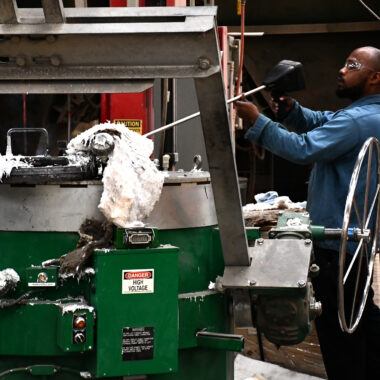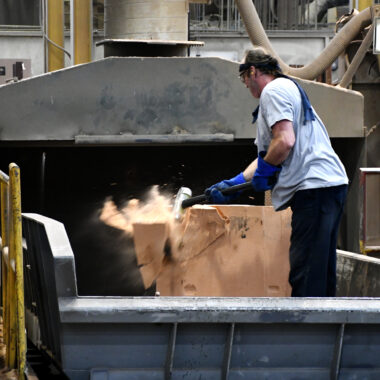Attain Excellence: Advanced Techniques in Casting Aluminum
Attain Excellence: Advanced Techniques in Casting Aluminum
Blog Article
Aluminum Spreading Services Revealed: Essential Insights and Tips
Discovering the realm of light weight aluminum casting solutions can introduce a world of intricate processes and nuanced considerations that are crucial for successful end results. As we venture into the realm of light weight aluminum spreading solutions, prepare to uncover the essential components that can form the trajectory of your jobs and raise your understanding of this elaborate craft.
The Essentials of Aluminum Spreading
What essential procedures are involved in aluminum casting that develop the foundation of this extensively utilized manufacturing technique? Aluminum casting is a economical and versatile technique made use of in various markets to develop complex and elaborate steel parts. The procedure starts with the melting of aluminum ingots in a furnace, generally at temperatures ranging from 1220 ° F to 1670 ° F, relying on the certain aluminum alloy being utilized. When molten, the light weight aluminum is put right into a pre-designed mold and mildew tooth cavity, where it solidifies and takes the form of the mold.
After solidification, the mold and mildew is removed, and the spreading undertakes finishing procedures such as warm machining, surface area, and therapy layer to meet the needed requirements. Understanding these essential processes is important for achieving top notch light weight aluminum spreadings with mechanical residential or commercial properties and exact dimensions.
Different Casting Methods Clarified
Discovering the various strategies employed in aluminum casting offers valuable understandings right into the diverse methods utilized to accomplish elaborate and accurate metal parts. One common method is sand casting, where a mold and mildew is developed making use of compacted sand around a pattern of the desired part. One more approach, die casting, involves infusing liquified light weight aluminum into a steel mold under high stress.
Variables to Take Into Consideration When Choosing a Supplier
When choosing an aluminum spreading company, reviewing their experience and experience is essential for guaranteeing quality and dependability in the production procedure. The service provider's experience in the area shows their experience with different casting techniques, possible difficulties, and best methods. It is vital to make inquiries concerning the types of tasks they have worked with in the past, ensuring they line up with the complexity and requirements of your own task.
Additionally, think about the supplier's credibility within the sector. Try to find testimonials, testimonials, and study that show their capability to supply top notch aluminum spreadings regularly. A credible copyright will certainly often have accreditations or affiliations with sector companies, showcasing their dedication to quality and adherence to sector standards.
Furthermore, assess the company's capacities in terms of modification, quantity requirements, and project timelines. Make sure that they can suit your details requirements and have the versatility to scale production as required. Effective interaction and openness concerning costs, preparation, and quality assurance procedures are also important factors to consider when selecting a light weight aluminum spreading solution provider.

Usual Challenges and Solutions
Navigating via the intricacies of light weight aluminum casting procedures typically provides manufacturers with a collection of obstacles that need cutting-edge services to make sure effectiveness and top quality in production. One typical obstacle encountered in light weight aluminum spreading is the formation of defects such as porosity, shrinkage, or Learn More Here inclusions due to improper mold and mildew design or insufficient metal top quality.
Executing sophisticated modern technologies like computer-aided style (CAD) and computer system mathematical control (CNC) machining can enhance precision and uniformity in aluminum spreading. By spending in automation and real-time monitoring systems, suppliers can boost procedure control and reduce variants, eventually enhancing the general top quality of light weight aluminum actors products.
Tips for Optimizing Your Casting Projects
By guaranteeing that the gating system is properly designed and correctly positioned, you can improve the flow of liquified light weight aluminum and reduce the chances of problems in the final spreading. Additionally, making use of computer system simulations can aid in analyzing the flow and forecasting of metal during the spreading process, allowing for changes to be made prior to real manufacturing begins.

Verdict
Finally, understanding the essentials of aluminum casting, different spreading techniques, variables to consider when choosing a service provider, usual difficulties and services, and pointers for maximizing spreading projects are important for successful results. By sticking to these insights and applying ideal companies, practices and individuals can ensure effective and efficient aluminum casting solutions that meet their particular demands and demands.
Understanding these fundamental procedures is important for accomplishing high-grade aluminum castings with mechanical homes and accurate dimensions.
When choosing an aluminum spreading solution copyright, reviewing their experience and knowledge is vital for making sure high quality and dependability in the production process. Effective interaction and transparency concerning costs, lead times, and top quality control procedures are likewise essential aspects to take into consideration when choosing a light weight aluminum casting service supplier.
Browsing through the intricacies of light weight aluminum spreading processes usually offers makers with a series of obstacles that need cutting-edge options to make certain performance and high quality in manufacturing. One typical obstacle dealt with in aluminum casting is the development of defects such as porosity, shrinking, or inclusions due to incorrect mold and mildew layout or insufficient steel quality.
Report this page